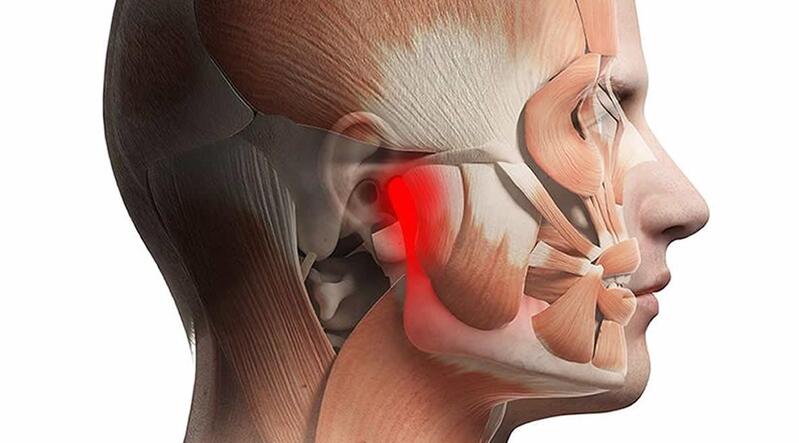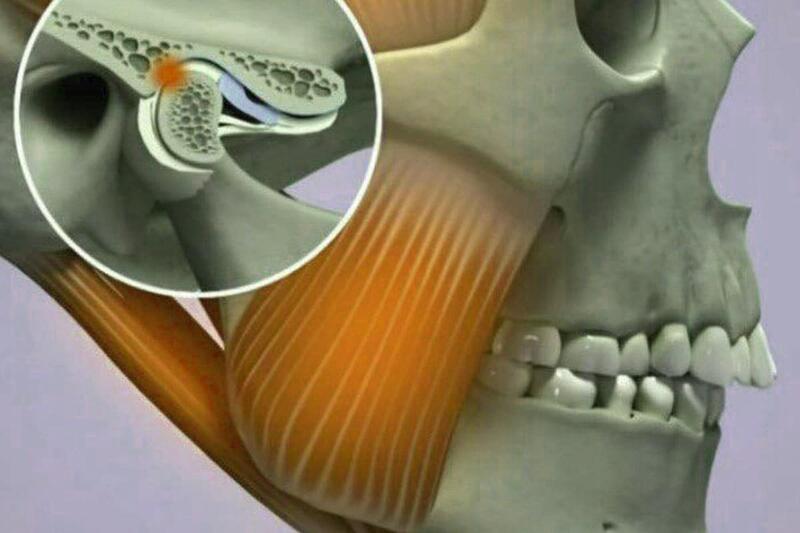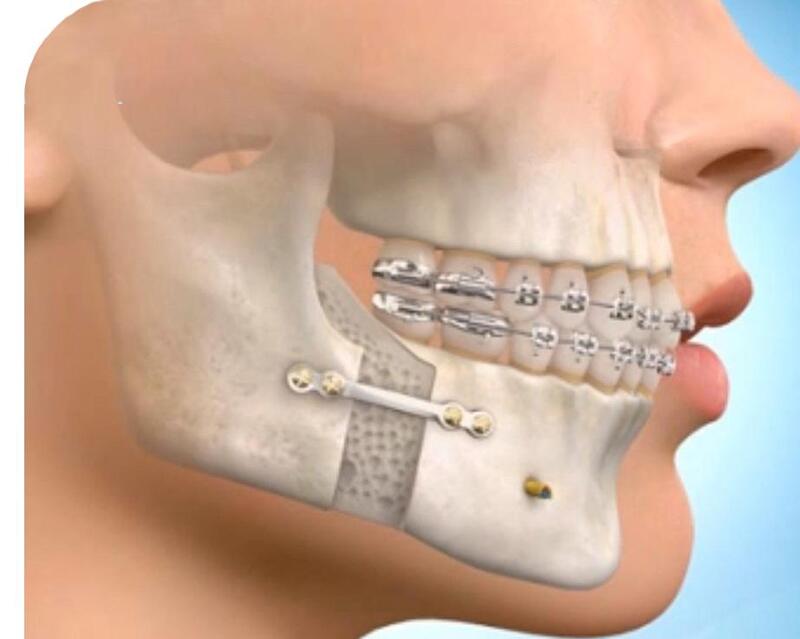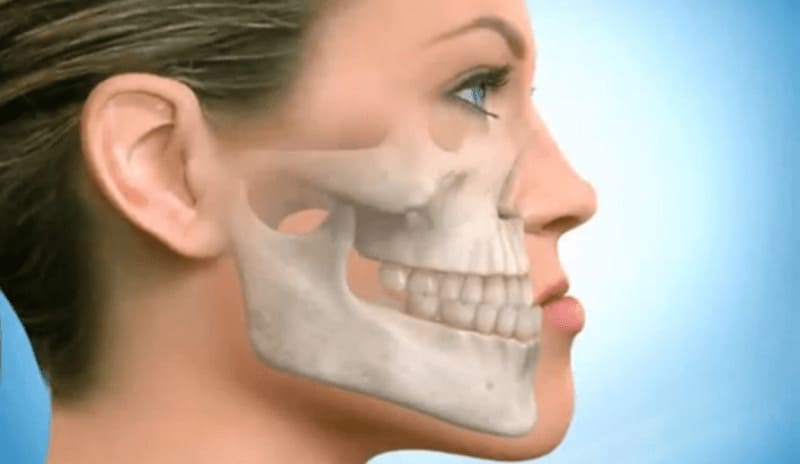Can Jaw Clicking Be Treated?

Contents:
Statistically, 40% of the world’s population has periodic jaw clicking when opening the mouth, talking, yawning, or biting food. The sounds are produced by the temporomandibular joint (TMJ). Unfortunately, the click is often accompanied by clicking, creaking, sharp pain in the ear, jaw shifting to the side, inability to fully open the mouth, headaches, and sleep disorders.
The temporomandibular joint connects the lower jaw and temporal bone. It is mobile and is under considerable strain when chewing, speaking, and making facial expressions. Unpleasant sounds can indicate the initial stage of the disease.
Many patients do not know what to do if their jaw clicks and prefer waiting until the problem solves itself, therefore, missing the right moment. An oral surgeon, orthodontist or gnathologist treats TMJ disorders. The specialist can use the following methods: examination, X-ray, and CT scan. Then, depending on the diagnosis, a dental specialist chooses the treatment method.
Without therapy, discomfort, pain, clicking, and crunching may temporarily disappear spontaneously but reappear with greater intensity. Over time, chondrodysplasia and bone dystrophy occur, and the joint partially or entirely fails to perform its functions.

TMJ disorders are successfully treated with therapeutic or surgical methods; you only need to contact a specialist in time. The earlier the disease treatment begins, the faster and easier the recovery.
What Shall I Do if My Jaw Starts Clicking when I Open my Mouth?
If your jaw pops when you open your mouth, yawn and chew, you should stick to the following actions:
- Make an appointment to see a doctor (orthodontist, gnathologist).
- Undergo the suggested diagnostics: X-ray, CT, MRI, ultrasound, gnathodinamometry, arthrography, visual examination, and consultations of interdisciplinary specialists, for example, ENT specialist, neurologist, rheumatologist, laboratory tests.
- Getting a diagnosis.
- Start treatment according to the plan drawn up by the doctor.
- During therapy, adhere to a gentle regime (do not eat solid food, do not use chewing gum, do not engage in particular sports (martial arts) or vocal workouts), and avoid stressful situations.
- After recovery, follow the recommendations of a specialist to avoid the recurrence of the disease.
The problem with TMJ disorder is often solved by eliminating the cause of the disease: correct dentures, treatment of injuries and inflammation, and elimination of stressful conditions.
If an improper bite causes joint dysfunction, braces can help correct it. But, sometimes, it is enough to adjust your lifestyle and habits to prevent the disease.
How Is Jaw Clicking Treated?
Among the therapeutic methods of treatment are the following:
- Splint therapy – wearing special splints that correct the position of the joint elements and normalise their function. The splint is a mouth guard that fixes the jaws in their normal position.
- TENS therapy – electrostimulation of the muscles to eliminate hypertonicity and prevent muscle atrophy, immobilising the jaw. The treatment affects not only the facial area but also the neck, shoulder and back areas.
- Botulinum therapy – injections of neuroproteins that block the transmission of nerve impulses to the muscles, promoting relaxation and tension relief.
- Correction of bite, prosthetics – includes different methods of restoring the normal position of the jaws. Implants, crowns and partial dentures are used to reconstruct missing teeth. Braces, mouthguards and plates are used for bite correction.
- Anti-inflammatory therapy.
The doctor chooses the therapy method based on diagnosing and assessing the patient’s health condition and lifestyle. Often, if the jaw clicks, a complex treatment is used, which includes several techniques simultaneously, supplemented through physical therapy, gymnastics, massage and psychotherapy.

Specialised professionals often suggest the parallel treatment of ENT diseases and endocrine disorders to eliminate the problem successfully. On the other hand, treating TMJ disorder is a long process constantly monitored by a doctor and requires effort from the patient.
Therapeutic methods are effective at stages 1-2 of the disease. Usually, the problem is effectively solved in 90% of patients. However, with pronounced morphological changes in the joint, surgical intervention (osteoplasty, intra-articular disc replacement) is required in some cases.
What Does Jaw Clicking Mean?
Causes of the TMJ cracking, clicking, and grinding:
- the disease onset of a condition called TMJ dysfunction;
- arthritis;
- displacement of the articular disc due to trauma or inflammation;
- gases dissolved in the fluid surrounding the joint (this is considered non-hazardous and does not require treatment);
- otitis media (inflammation of the middle ear);
- malocclusion, poor quality dentures, missing several teeth, the habit of chewing food on one side of the jaw, biting down on pens and pencils;
- abnormal posturing;
- congenital abnormalities of the TMJ;
- spasms, stress, excessive jaw clenching, bruxism, and the working habits of certain professions (singers, teachers, actors, lecturers).
Different reasons can cause these diseases requiring, therefore, a particular approach. It is impossible to determine why the jaw clicks independently. If you have a problem, you should immediately make an appointment with a doctor to diagnose and prescribe appropriate treatment.
According to dentist observations, 65% of unpleasant sounds (crunch, creaking, clicking) are associated with joint dysfunction. In addition, malocclusion (teeth contact), the function of muscles and ligaments, and the relative positioning of elements can cause TMJ disorder. TMJ dysfunction can describe several diseases: arthritis, arthrosis, Costen’s syndrome, jaw subluxation and myofascial syndrome).
Arthritis is a group of inflammatory diseases. Its causes are infections (tuberculosis, brucellosis), trauma, metabolic disorders, and autoimmune diseases.
Osteoarthritis – a degenerative joint disease leading to the gradual destruction of cartilage tissue and bone overgrowth. It occurs due to lifestyle and professional activities, genetic predisposition, and as a complication of certain diseases.

Can you stop the jaw from clicking? Simple precautions to prevent TMJ disorder:
- avoid injuries and overexertion;
- do not try to chew bones or bite nuts in shells or candies;
- try not to open your mouth too wide when yawning or biting down on food;
- watch your posture;
In case of malocclusion or missing elements of the dentition, promptly perform prosthetics and correct teeth alignment;
In case of systemic diseases (diabetes mellitus, thyroid disorder, etc.), undergo treatment in time.
Frequent Causes of Jaw Clicking

Dentists note that 90% of the population has a malocclusion (distal, mesial, deep or open). The incorrect relative positioning of the jaws leads to uneven load on the chewing apparatus, and in almost 100% of cases, it eventually causes TMJ dysfunction. Therefore, defining the pathology and treating it in childhood when the bite is still being formed is essential.
Poor quality dentures or fillings or the long-term absence of one or more teeth may also lead to poor jaw articulation, resulting in TMJ dysfunction. If a patient experiences discomfort after a crown or implant placement, it is worth seeing a doctor immediately to eliminate the cause.
A common cause of temporomandibular joint disorders is the improper treatment of injuries (dislocations, fractures) sustained during sports or professional activities. As a result, it causes occlusal imbalance leading to the gradual development of TMJ dysfunction. Treatment of these pathologies is often performed surgically.
Bruxism, or teeth grinding due to facial muscle spasms, is another common cause of TMJ disorders. The disease is difficult to diagnose because the patient is often unaware of the problem. Teeth grinding can occur at night, in their sleep, or during periods of significant stress.
You can assume the disease by the following signs:
- incisors abrasion;
- chipped teeth;
- teeth sensitivity;
- severe masticatory muscles tension;
- pain when touching the joints;
- morning headaches.
Causes of this condition can be stress, nervous tension, neurological and mental illness, and taking certain medications. Treatment requires the combined efforts of a dentist, neurologist, and psychologist.
Bad posture can also lead to the development of TMJ. For example, a sedentary lifestyle, a desk job (programmer, garment worker, shoemaker, designer, nail technician), the habit of slouching while walking, sleeping on a too-soft bed with a high pillow, and lifting heavy objects – all these factors lead to spine deformation and overstraining of the neck, back, shoulders, and face muscles.
Timely access to professional care and identifying the causes of jaw clicking will help to prevent the disease at an early stage.

